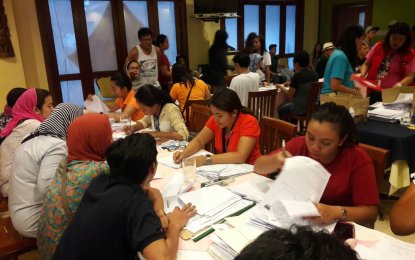Philippine News
Workers on Boracay closure: ‘It’s painful, but rewarding’

One of the more than a hundred displaced workers who lined up at the social welfare department’s office was Samia Macalanggan, who came to the island all the way from Marawi City some 10 years ago just to earn a living. (PNA photo)
BORACAY — Two days before the crown jewel of the country’s tourism industry, Boracay Island, closes its doors to tourists, workers hit by its closure flocked to the Department of Social Welfare and Development’s extension office here Tuesday, after the agency opened its Operations Center to assist affected workers and residents.
One of the more than a hundred displaced workers who lined up at the social welfare department’s office was Samia Macalanggan, who came to the island all the way from Marawi City some 10 years ago just to earn a living.
Macalanggan was one of the many workers who witnessed how wanton destruction plagued the island through the years in the name of profit.
“Boracay is beautiful, it’s peaceful. Unlike in my hometown where war persists, the people here just bother about work,” she said in Filipino.
“But we, the residents here, support the island’s closure. The number of hotels and establishments has gone way too high, it has not been controlled,” she continued.
While she feels bad about losing her job, she said there is no argument that the island will emerge better once its problems are addressed.
“It would be difficult at first, but once rehabilitation is finished, we will all benefit from it,” she explained.
For his part, Elias Rigaro, a sunglass vendor for eight years, said while he certainly feels the brunt of the island’s shutdown. He said the closure of Boracay is a step in the right direction.
“For me, Boracay should really be rehabilitated. There are sewerages flowing through the main road, and the government should act because of the influx of tourists here,” he said in Filipino.
In an interview, Joey Urquiola, head of DSWD’s branch office in Aklan, said the local government has put up the Operations Center to document the status of affected workers and residents in the area.
“DSWD’s response is to help migrant workers return home. Once this phase is completed, once we already extended support to them, then enters rehabilitation of the island and address the adverse effect of the economy in Malay,” he said.
“The important process here is the profiling of people leaving this place. Because once they return to their provinces, what we will primarily do is know what happens to them when they go home. We need to consolidate information so we can at least refer them to other regions,” he added.
Urquiola said the fate of Boracay serves as a warning to other local tourist destinations in the country, especially those in which investments prevail over environmental protection.
“Like boxing, there should be a referee. In the case of Boracay, a referee should help in the regulation. There should be one to prevent abuse. And President (Rodrigo) Duterte’s move to rehabilitate Boracay is right,” he said.
At the end of the day, he said the Chief Executive’s “political will” pressed for the much-needed rehabilitation of Boracay.





















